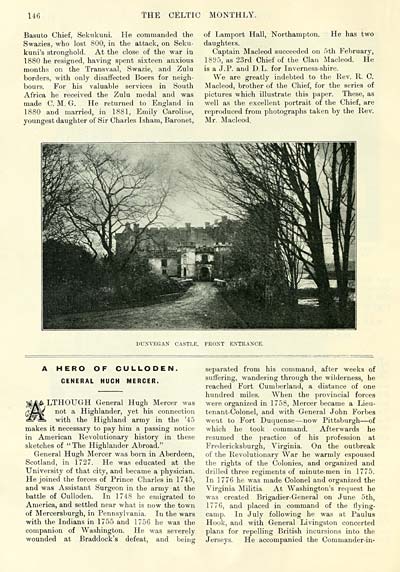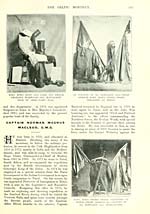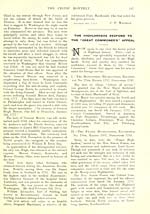Blair Collection > Celtic monthly > Volume 6, 1898
(212)
Download files
Complete book:
Individual page:
Thumbnail gallery: Grid view | List view

U6
fHE CELTIC MONTHLY.
Basuto Chief, Sekiikuni. He commanded the
Swazies, who lost 800, in the attack, on Seku-
kuni's stronghold. At the close of the war in
1880 he resigned, having spent sixteen anxious
months on the Transvaal, Swazie, and Zulu
borders, with only disaffected Boers for neigh-
bours. For his valuable services in South
Africa he received the Zulu medal and was
made C. M. G. He returned to England in
1880 and married, in 1881, Emily Caroline,
youngest daughter of Sir Chai-les Isham, Baronet,
of Lamport Hall, Northampton. He has two
daughters.
Captain Macleod succeeded on .5th February,
1895, as 23rd Chief of the Clan Macleod. He
is a J. P. and D.L. for Inverness-shire.
We are greatly indebted to the Rev. R. C.
Macleod, brother of the Chief, for the series of
pictures which illustrate this paper. These, as
well as the excellent portrait of the Chief, are
reproduced from photographs taken by the Rev.
Mr. Macleod.
DUNVEGAN CASTLE, FRONT ENTRANCE.
A HERO OF CULLODEN.
GENERAL HUGH MERCER.
1^1* LTHOUGH General Hugh Mercer was
(\j^f not a Highlander, yet his connection
<&^> with the Highland army in the '45
makes it necessary to pay him a passing notice
in American Revolutionary history in these
sketches of " The Highlander Abroad."
General Hugh Mercer was born in Aberdeen,
Scotland, in 1727. He was educated at the
University of that city, and became a physician.
He joined the forces of Prince Charles in 1745,
and was Assistant Surgeon in the army at the
battle of Culloden. In 1748 he emigrated to
America, and settled near what is now the town
of Mercersburgh, in Pennsylvania. In the wars
with the Indians in 1755 and 1756 he was the
companion of Washington. He was severely
wounded at Braddock's defeat, and being
separated from his command, after weeks of
suffering, wandering through the wilderness, he
reached Fort Cumberland, a distance of one
hundred miles. When the provincial forces
were organized in 1758, Mercer became a Lieu-
tenant-Colonel, and with General John Forbes
weat to Fort Duquense — now PittsVjurgh — of
which he took command. Afterwards he
resumed the practice of his profession at
Fredericksburgh, Virginia. On the outbreak
of the Revolutionary War he warmly espoused
the rights of the Colonies, and organized and
drilled three regiments of minute-men in 1775.
In 1776 he was made Colonel and organized the
Virginia Militia At Washington's request he
was created Brigadier-General on June 5th,
1776, and placed in command of the flying-
camp. In July following he was at Paulus
Hook, and with General Livingston concerted
plans for repelling British incursions into the
Jerseys. He accompanied the Commander-in-
fHE CELTIC MONTHLY.
Basuto Chief, Sekiikuni. He commanded the
Swazies, who lost 800, in the attack, on Seku-
kuni's stronghold. At the close of the war in
1880 he resigned, having spent sixteen anxious
months on the Transvaal, Swazie, and Zulu
borders, with only disaffected Boers for neigh-
bours. For his valuable services in South
Africa he received the Zulu medal and was
made C. M. G. He returned to England in
1880 and married, in 1881, Emily Caroline,
youngest daughter of Sir Chai-les Isham, Baronet,
of Lamport Hall, Northampton. He has two
daughters.
Captain Macleod succeeded on .5th February,
1895, as 23rd Chief of the Clan Macleod. He
is a J. P. and D.L. for Inverness-shire.
We are greatly indebted to the Rev. R. C.
Macleod, brother of the Chief, for the series of
pictures which illustrate this paper. These, as
well as the excellent portrait of the Chief, are
reproduced from photographs taken by the Rev.
Mr. Macleod.
DUNVEGAN CASTLE, FRONT ENTRANCE.
A HERO OF CULLODEN.
GENERAL HUGH MERCER.
1^1* LTHOUGH General Hugh Mercer was
(\j^f not a Highlander, yet his connection
<&^> with the Highland army in the '45
makes it necessary to pay him a passing notice
in American Revolutionary history in these
sketches of " The Highlander Abroad."
General Hugh Mercer was born in Aberdeen,
Scotland, in 1727. He was educated at the
University of that city, and became a physician.
He joined the forces of Prince Charles in 1745,
and was Assistant Surgeon in the army at the
battle of Culloden. In 1748 he emigrated to
America, and settled near what is now the town
of Mercersburgh, in Pennsylvania. In the wars
with the Indians in 1755 and 1756 he was the
companion of Washington. He was severely
wounded at Braddock's defeat, and being
separated from his command, after weeks of
suffering, wandering through the wilderness, he
reached Fort Cumberland, a distance of one
hundred miles. When the provincial forces
were organized in 1758, Mercer became a Lieu-
tenant-Colonel, and with General John Forbes
weat to Fort Duquense — now PittsVjurgh — of
which he took command. Afterwards he
resumed the practice of his profession at
Fredericksburgh, Virginia. On the outbreak
of the Revolutionary War he warmly espoused
the rights of the Colonies, and organized and
drilled three regiments of minute-men in 1775.
In 1776 he was made Colonel and organized the
Virginia Militia At Washington's request he
was created Brigadier-General on June 5th,
1776, and placed in command of the flying-
camp. In July following he was at Paulus
Hook, and with General Livingston concerted
plans for repelling British incursions into the
Jerseys. He accompanied the Commander-in-
Set display mode to: Large image | Transcription
Images and transcriptions on this page, including medium image downloads, may be used under the Creative Commons Attribution 4.0 International Licence unless otherwise stated. ![]()
| Early Gaelic Book Collections > Blair Collection > Celtic monthly > Volume 6, 1898 > (212) |
|---|
| Permanent URL | https://digital.nls.uk/75857115 |
|---|
| Shelfmark | Blair.58 |
|---|---|
| Additional NLS resources: | |
| Attribution and copyright: |
|
| Description | A selection of books from a collection of more than 500 titles, mostly on religious and literary topics. Also includes some material dealing with other Celtic languages and societies. Collection created towards the end of the 19th century by Lady Evelyn Stewart Murray. |
|---|
| Description | Selected items from five 'Special and Named Printed Collections'. Includes books in Gaelic and other Celtic languages, works about the Gaels, their languages, literature, culture and history. |
|---|

